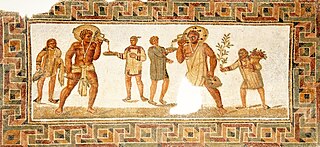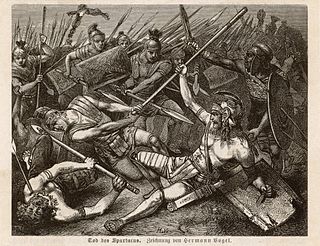
The Peloponnesian War was an ancient Greek war fought between Athens and Sparta and their respective allies for the hegemony of the Greek world. The war remained undecided for a long time, until the decisive intervention of the Persian Empire in support of Sparta. Led by Lysander, the Spartan fleet, built with Persian subsidies, finally defeated Athens and started a period of Spartan hegemony over Greece.

The 2nd century BC started the first day of 200 BC and ended the last day of 101 BC. It is considered part of the Classical era, although depending on the region being studied, other terms may be more suitable. It is also considered to be the end of the Axial Age. In the context of the Eastern Mediterranean, it is the mid-point of the Hellenistic period.
Year 132 BC was a year of the pre-Julian Roman calendar. At the time it was known as the Year of the Consulship of Laenas and Rupilius and the Third Year of Yuanguang. The denomination 132 BC for this year has been used since the early medieval period, when the Anno Domini calendar era became the prevalent method in Europe for naming years.
This article concerns the period 139 BC – 130 BC.

The First Servile War of 135–132 BC was a slave rebellion against the Roman Republic, which took place in Sicily. The revolt started in 135 when Eunus, a slave from Syria who claimed to be a prophet, captured the city of Enna in the middle of the island with 400 fellow slaves. Soon after, Cleon, a Cilician slave, stormed the city of Agrigentum on the southern coast, slaughtered the population, and then joined Eunus' army and became his military commander. Eunus even proclaimed himself king, under the name of Antiochus, after the Seleucid emperors of his native Syria.
Salvius Tryphon was an aulos player who was proclaimed king by the rebelling slaves of ancient Sicily during the Second Servile War against Rome.

The Second Servile War was an unsuccessful slave uprising against the Roman Republic on the island of Sicily. The war lasted from 104 BC until 100 BC.

The Third Servile War, also called the Gladiator War and the War of Spartacus by Plutarch, was the last in a series of slave rebellions against the Roman Republic known as the Servile Wars. This third rebellion was the only one that directly threatened the Roman heartland of Italy. It was particularly alarming to Rome because its military seemed powerless to suppress it.
The Servile Wars were a series of three slave revolts in the late Roman Republic:
Publius Rupilius, Roman statesman, consul in 132 BC. During the inquiry that followed the death of Tiberius Gracchus, conducted by himself and his colleague Popillius Laenas, he proceeded with the utmost severity against the supporters of Gracchus. In the same year he was despatched to Sicily, where he suppressed the revolt of the slaves under Eunus. During 131 BC he remained as proconsul of the island, and, with the assistance of ten commissioners appointed by the Senate, drew up regulations for the organization of Sicily as a province. These regulations were known by the title of leges Rupiliae, though they were not laws in the strict sense. Rupilius was subsequently brought to trial and condemned for his treatment of the friends of Gracchus. The disgrace of his condemnation, added to disappointment at the failure of his brother to obtain the consulship in spite of the efforts of Scipio, caused his death shortly afterwards.

Sicilia was the first province acquired by the Roman Republic, encompassing the island of Sicily. The western part of the island was brought under Roman control in 241 BC at the conclusion of the First Punic War with Carthage. A praetor was regularly assigned to the island from c. 227 BC. The Kingdom of Syracuse under Hieron II remained an independent ally of Rome until its defeat in 212 BC during the Second Punic War. Thereafter the province included the whole of the island of Sicily, the island of Malta, and the smaller island groups.

Eunus was a Roman slave from Apamea in Syria who became the leader of the slave uprising in the First Servile War in the Roman province of Sicily. Eunus rose to prominence in the movement through his reputation as a prophet and wonder-worker and ultimately declared himself king. He claimed to receive visions and communications from the goddess Atargatis, a prominent goddess in his homeland whom he identified with the Sicilian Demeter. Some of his prophecies were that the rebel slaves would successfully capture the city of Enna and that he would be a king some day.

Slavery in ancient Rome played an important role in society and the economy. Unskilled or low-skill slaves labored in the fields, mines, and mills with few opportunities for advancement and little chance of freedom. Skilled and educated slaves—including artisans, chefs, domestic staff and personal attendants, entertainers, business managers, accountants and bankers, educators at all levels, secretaries and librarians, civil servants, and physicians—occupied a more privileged tier of servitude and could hope to obtain freedom through one of several well-defined paths with protections under the law. The possibility of manumission and subsequent citizenship was a distinguishing feature of Rome's system of slavery, resulting in a significant and influential number of freedpersons in Roman society.
Gaius Cassius Longinus was a Roman consul in 73 BC.
Oenomaus was a Gallic gladiator, who escaped from the gladiatorial school of Lentulus Batiatus in Capua. Together with Spartacus, Crixus, Castus, and Gannicus, he became one of the leaders of rebellious slaves during the Third Servile War

The Bellum Siculum was an Ancient Roman civil war waged between 42 BC and 36 BC by the forces of the Second Triumvirate and Sextus Pompey, the last surviving son of Pompey the Great and the last leader of the Optimate faction. The war consisted of mostly a number of naval engagements throughout the Mediterranean Sea and a land campaign primarily in Sicily that eventually ended in a victory for the Triumvirate and Sextus Pompey's death. The conflict is notable as the last stand of any organised opposition to the Triumvirate.
Lucius Calpurnius Piso Frugi was a Roman politician and historian. He created the first permanent jury court in Rome to try cases related to provincial corruption during his plebeian tribunate in 146 BC. He also fought, not entirely successfully, in the First Servile War. He was consul in 133 BC and censor in 120 BC.

Spartacus was a Thracian gladiator (Thraex) who, along with Crixus, Gannicus, Castus, and Oenomaus, was one of the escaped slave leaders in the Third Servile War, a major slave uprising against the Roman Republic. Little is known about him beyond the events of the war, and surviving historical accounts are sometimes contradictory. All sources agree that he was a former gladiator and an accomplished military leader.
The gens Manilia was a plebeian family at ancient Rome. Members of this gens are frequently confused with the Manlii, Mallii, and Mamilii. Several of the Manilii were distinguished in the service of the Republic, with Manius Manilius obtaining the consulship in 149 BC; but the family itself remained small and relatively unimportant.









